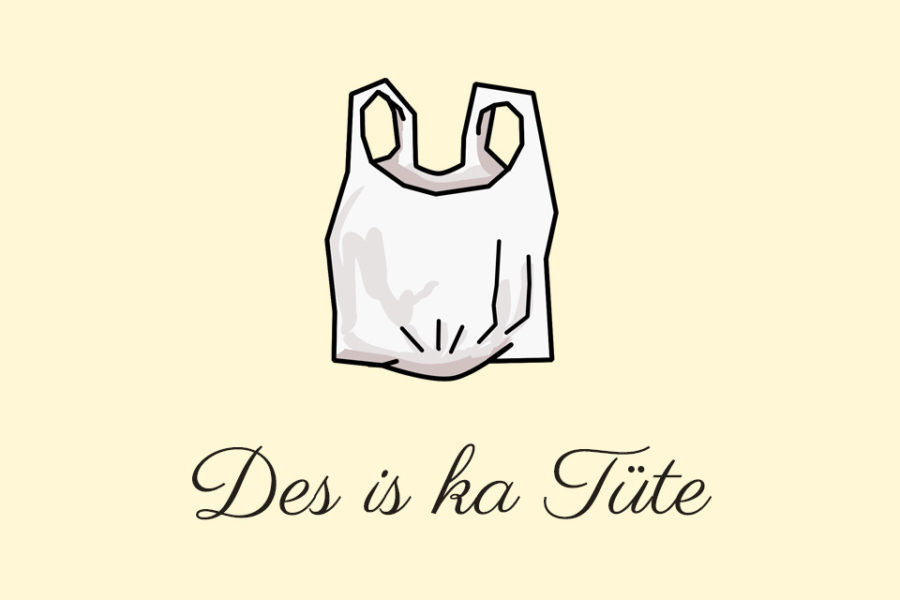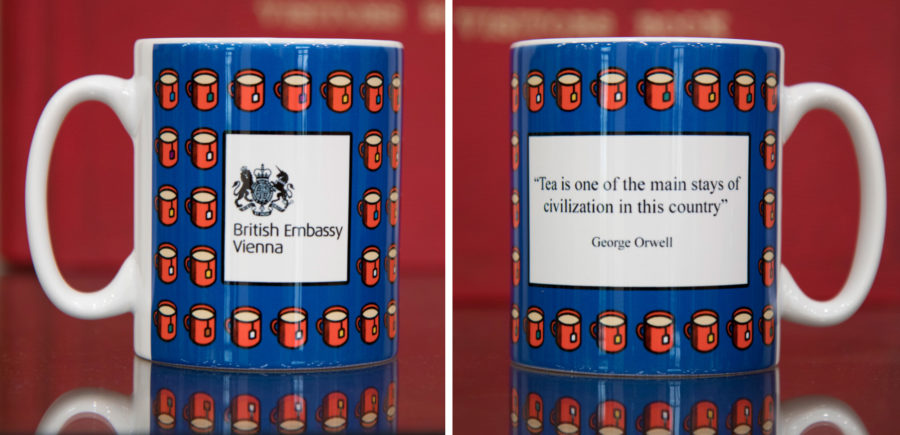7th September 2018 Vienna, Austria
When Austrian German is the best?

The quote that “Britain and America are two nations divided by a common language” is often attributed to Sir Winston Churchill. A version I hear often in Vienna is “nothing unites Austrians and Germans so much as their divided language” (“nichts verbindet Österreicher und Deutsche so sehr wie ihre geteilte Sprache”.
Austrian German is full of unique words, some stemming from Vienna’s melting-pot role in the Austro-Hungarian empire before 1918. Many, such as “Palatschinken” (a pancake), “Paradeiser” (a tomato) or “Beisl” (a restaurant) are to do with food.
For me, one difference is that whereas the United States, the United Kingdom and other countries where English is spoken basically have a single language with a vast range of accents and differences in usage and spellings, in Germany and Austria (and Switzerland) you have a range of dialects which are so different from each other as to be more or less incomprehensible.
If anyone has not seen my “Servus, ich bin Leigh!” video of September 2016, in which I massacre a few words in various Austrian dialects, do have a look.
Of course, I would never suggest that one version of a language is better than another (would anyone?) But I was intrigued recently to discover an Austrian word which seems to have no “Hochdeutsch” (high German) equivalent.
That word is “Häferl”, meaning a mug.

But wait! I hear you cry – surely in Germany you can have eine Tasse, or einen Becher?
The problem is that neither of these words translates quite so directly into “mug” as “Häferl”. A “Tasse” is usually more like a tea cup, whereas a “Becher” can equally be a cup, a beaker or something rather larger.
It follows that I have been using the word “Häferl” at every opportunity.
In fact there is quite a trend for Austrian words ending in “-erl”. My favourites include “Sackerl”, for what many Germans might call a “Tüte” or a plastic carrier bag and “Semmerl” for what in Germany might be a “Brötchen” or bread roll. I also like the Austrian word “fad” for the Hochdeutsch “langweilig” or boring. “Es ist mir wurscht”, for “I could not care less”, or possibly “I couldn’t give a sausage” also deserves an honourable mention.
What do you think? Do you have favourite Austrian words? Are there other words which exist in Austrian German which do not have a “Hochdeutsch” equivalent? Do let me know. And watch out for our rare and collectable British Embassy “Häferl” (pictured above) which we occasionally give away as prizes, or gifts at Embassy functions.
What about the most simple words that you need when you go shopping, like:
Potato – Kartoffel in German, but Erdäpfel in Austrian
Tomato – Tomate in German, but Paradeiser in Austrian
Pancakes – Pfannkuchen in German, but Palatschinken in Austrian
Plum – Pflaume in German, but Zwetschke in Austrian
Harz Cheese – Harzer Käse in German, but Quargel in Austrian
Cream – Sahne in German, but Obers in Austrian
Apricot – Aprikose in German, but Marille in Austrian
Chestnuts – Esskastanien in German, but Maroni in Austrian
Going to a ‘Beisl’ and order a beer and Gulasch makes your day.
Could be, during your stay, you may hear ‘zoin bitte’ or just someone
screaming (not very politely, but the waiter/waitress will hear it) ‘zoin’.
This is the Viennese word for ‘zahlen’ or ‘zahlen bitte’ = you want to
pay your meal. And maybe the next surprise will come: The waiter/waitress
will start an cross examination with you: ‘wos hama g’hobt’ (‘was haben
wir gehabt’ = what did you have?). Seems to be a tradition in Vienna,
they serve to the table, but at the end they ask you again about your
consumption.
‘Schwein gehabt” means, I was in a lucky situation, or I have been lucky,
nothing happened to me. ‘Die Polizei hat kontrolliert, aber nicht mich. Da
habe ich Schwein gehabt, weil ich war betrunken!’. Police control, they did
not stop me, lucky as I am, because I was drunk.
But please beware of, you can not use ‘Schwein gehabt’ in reverse!
There is this story of an Far East/Asian Amabssador, who liked to use the
german language and all those colloquial phrases. So one day, on the Opera
Ball, he was asked: ‘The beautiful wife of Ambassador XYZ is round, did you
dance with her?’. He replied: ‘nein, das Schwein habe ich noch nicht gehabt!’
A salutary tale – or is it tail? Thank you!
I find it interesting that in different regions within Austria there are different words for the same thing. In Carinthia, Grüne Bohnen becomes Strankerln, which then becomes Fisolen in Vienna. No hope for those of us who are still learning German…
There is always hope! I continue to study German in the hope that I can improve my skills. But as with every language, there is no upper limit. I like some of the Vienna dialect words such as Beisl (apparently from the Yiddish).
I find it interesting that there are variations for even the most everyday items within Austria – in Carinthia Grüne Bohnen are Strankerln and in Vienna they are called Fisolen! No hope for those of us trying to learn German…
A friend of mine, she is born in South America, studied in the United States, now she is an Austrian, but we still communicate in english – well, she asked me one day: ‘what is -schiach- ?’
Not so easy to explain, can be used just in certain situations!
Someting like the english word ‘ugly’, depends on taste.
– das ist ein schiaches Auto (the car is not my taste)
– die Blumen sind schon schiach! (the flowers had their best time)
– mein Nachbar is ein schiacher Mensch (…)
– mein Nachbar hat eine schiache Frau (…)
For him ‘schiacher’ for her ‘schiache’ – this make the german language so difficult!
– das Mädchen ist aber gar nicht schiach! (ironic, in fact one means, she is nice)
Diese Antwort ist echt leiwand!
Leiwand – for somerthing really amazing!
One of my favourites, too. Oida!
I like the phrase “etwas geht sich aus”. It could either mean there’s enough time for something or there’s enough space.
Yep – elegant indeed. Es geht sich aus, indeed.
“[…] in Germany and Austria (and Switzerland) you have a range of dialects which are so different from each other as to be more or less incomprehensible.”
That’s true, but there is an official Austrian standard German. It’s mainly used in the media and in written language. That’s the reason why we have our own dictionary where words like “Paradeiser” and “Häferl” are standardized.
Thanks! Leigh
The word Häferl actually has a second meaning. If a person is a Häferl then that person gets angry very easily.
See also here: http://www.echtwien.at/home/literatur/lexikon/H/861
Indeed I have heard that meaning. Hard to understand the connection between a mug and an irritable person…
Jessasmarandjosef! – Oh my God!
Ein Meterprügel – a small person
Ein Piefke – somebody from Germany
Ein Schlagl – a stroke
Ein Machatschek – boss, somebody in charge of something
Eine Palatschinken – pancake (in Germany: dünner Eierkuchen)
I am not sure all of these are politically correct. But thanks for the collection!
I don’t know where you heard “I couldn’t give a sausage”/”I könnt ka Wuascht gebn,” but you’re probably referring to the familiar “Is mia wuascht” – “It’s sausage to me” 😀
But the Häferl affair is much more complex than this, you can have a look at some more meanings and idioms around it @ http://www.ostarrichi.org/dictionary-search.html?search=häferl
You are quite right about the complexity of “Häferl”. Is mia wuascht? Nein!
Gschloder – to thin or bad tasting drink specially coffee/tea
Wunderwuzi – A jack of all trades, provider of unexpected top performances
tachinieren – laze while working, avoid work
Excellent examples. Thank you!
When I was in Germany for some interviews at first I asked “Können wir uns ein paar Sessel holen?”. I meant some simple chairs to sit on.
My contact person looked at me in horror: “Wo sollen wir Sessel herbekommen?”
me “Wir könnten die nehmen die da drüben stehen” pointing to some chairs standing beside
Then we realized in Germany I would have to ask for a “Stuhl”, the word “Sessel” in Germany means more of an arm chair.
These differences are particularly tricky. “Wo sollen wir Sessel bekommen,” indeed.
eppa – It’s not used all over Austria and I can only speak for Burgenland on this matter but it basically means “vielleicht” or “maybe/may”.
To give an example: “wüßt eppa nochha no wos mochn?” “Willst du vielleicht nachher noch etwas unternehmen/machen?”
That is impressively incomprehensible and a good eg of dialect. Thanks so much!
From Kaernten: a kotz – eine Katze
Kipferl – traditional yeast roll in crescent shape
Tuchent – in German Federbett, duvet, feather bed
Polster – in German Kissen – pillow
Obers – in German Sahne – cream
Patschen – Hausschuh mit Fersenteil (in Unterscheidung zum Schlapfen) – slippers
Excellent examples. Interesting how many dialect words have to do with food and domestic items.